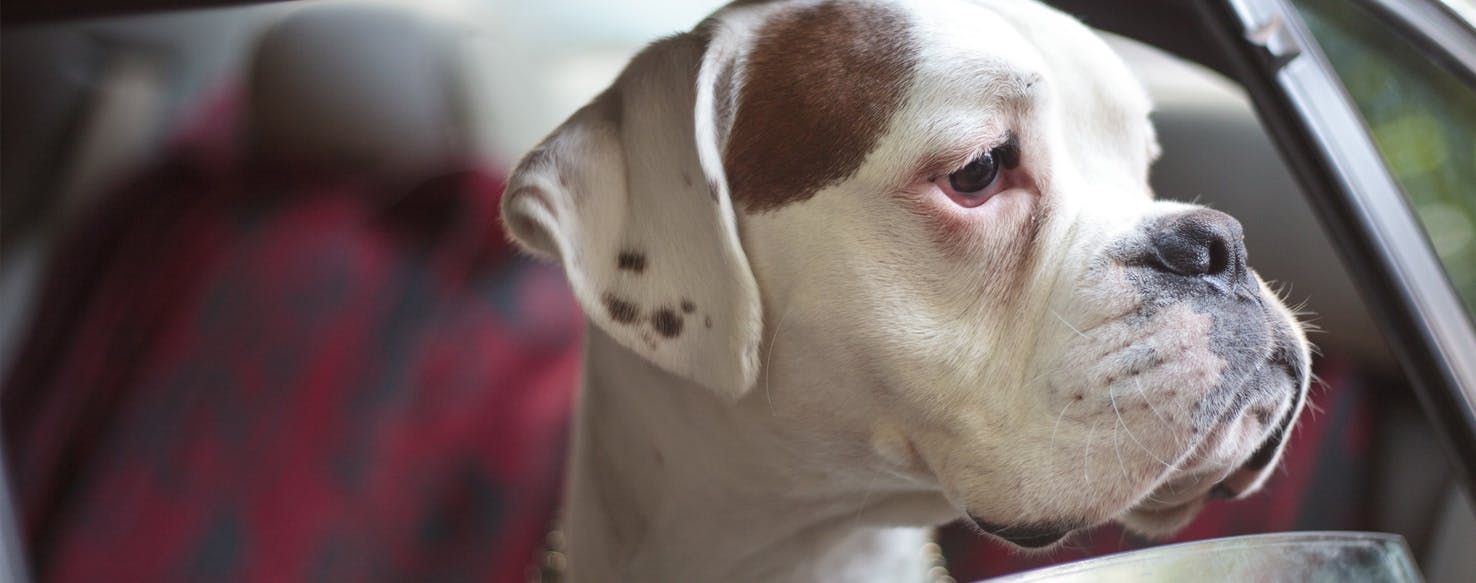You're cruising down the highway with your canine companion-- everything seems great, your dog is happy to be with you rather than left at home. Then suddenly, you hear the horrible sound of your dog retching, followed by the awful smell of dog vomit! Road trip officially ruined!
Dogs, like people, can get motion sickness, and like in people, youngsters tend to be more affected, perhaps due to lack of development in the inner ear which regulates balance and contributes to motion sickness. But what if your mature dog gets car sick?
When dogs experience motion sickness from traveling in their owner’s cars, characterized by panting, reluctance to ride in the car, sometimes drooling, and vomiting, most owners need to come up with a solution to the problem so their furry friend can be transported when required for medical appointments, grooming, and vacations. Although not serious, car sickness is inconvenient. Fortunately, there are several ways to help prevent motion sickness in your dog.
Causes and Prevention of Car Sickness in Dogs
Motion sickness in young dogs may be due to lack of development in the inner ear that helps regulate balance. Discrepancies in the balance system during auto travel can result in car sickness. A young dog may outgrow this issue in time. It is important not to punish your young dog for being car sick or make a big deal of it, which may cause him to associate car rides with a negative experience.
You can help your young dog’s balance system by having them travel facing forward and allowing them to see out the window, so their visual cues match their inner ear sensations more closely. Keeping the vehicle cool with AC or better yet, opening windows a crack to equalize pressure and provide air movement may also help. Introduce young dogs to car travel with short trips and gradually build up to longer ones. If you need to make a long trip, frequent stops to allow your young dog fresh air may help. Never restrict water, but restricting food may be helpful. Hopefully, with these precautions and maturation, your dog will outgrow their car sickness shortly.
Sometimes mature dogs experience car sickness because they are prone to upset stomach or balance issues which contribute to motion sickness. If this occurs, the same prevention steps listed above for young dogs can be helpful. In addition, you may be able to counteract nausea with peppermint, ginger or chamomile spray in your car, all of which are known to have anti nausea effects. Some dog are less likely to get car sick on an empty stomach, others do better if given a light meal. You may need to experiment to see what works best for your dog suffering from chronic car sickness. You can also obtain anti nausea medications from your veterinarian if needed. Some owners have found that using an Elizabethan collar, the “lampshade” kind, works for preventing car sickness. Although the exact mechanism is not understood, it is worth a try.
Some mature dogs may associate car travel with unpleasant experiences and get themselves worked up, anxious, or nervous, resulting in them being sick. This may be because they associate car rides with unpleasant experiences such as being sick as a puppy, trips to the vet, or trips to a kennel, or they may just be afraid of the sights and sounds the car presents. If your dog’s sickness appears to be related to anxiety, there are several steps you can take to minimize it.
Provide a favorite toy or blanket, or use their crate, if they are crate trained, to provide a familiar comforting surrounding. Acclimatize the dog to the car by sitting in it without the motor running, and taking short trips to a “happy place”, such as a park, or friend’s place. Gradually build up to longer rides. Travel with a passenger who can comfort the dog during the trip. If necessary, you can get anti-nausea medication or sedatives for your dog when trips are required. Some dogs may benefit from anxiety wraps, which provide gentle all over pressure to your dog's body; several are available commercially. Remember not to punish your dog or become agitated if they get sick so they do not associate car rides with stress from their owners, which can contribute to anxiety. Behavior modification and conditioning efforts to acclimate your dog to car rides and make them less stressful are usually successful if patience, persistence, and consistency are used by dog owners.
Once you find the most effective way to prevent your dog's car sickness, you will be able to transport your dog when needed without the unpleasant effects of having a sick dog. Nobody wants to clean dog vomit off their car’s upholstery or drive with the unpleasant smell of a sick dog in the car.
For dogs that experience car sickness due to anxiety, reducing their anxiety on car rides can also extend to preventing anxiety in other situations, as your dog gains more confidence in you, and similar methods can be applied to other situations.
Getting to Root of the Issue
Car sickness in dogs can be the result physical or emotional issues. Young dogs often outgrow the condition, and a little patience and precautions to minimize motion sickness are all that is needed. If your dog experiences chronic physical motion sickness, there are steps you can take to help prevent them from experiencing sickness, including medication and minimizing physical conditions that contribute to motion sickness. Dogs with anxiety issues can benefit from consistent, patient, conditioning to counteract their anxiety on car rides. Remember not to get angry or punish your dog when they are sick. It is not something that is within their control, and impatience or punishment will contribute to the problem rather than solve it.


